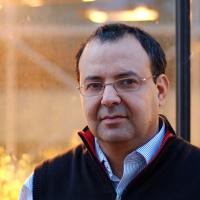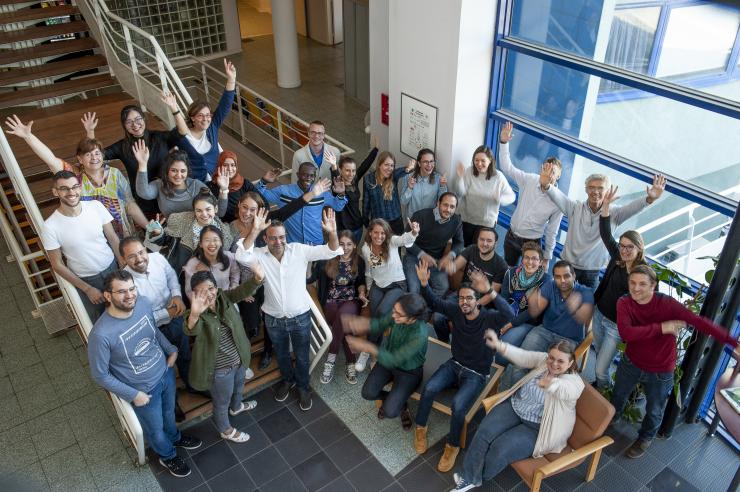
Agroecology Reading time 6 min
Abdelhafid Bendahmane, research in bloom
Published on 05 December 2018
Abdelhafid Bendahmane is a research director at the Paris Saclay Institute of Plant Sciences (IPS2), which is part of INRA Île-de-France – Versailles-Grignon. His laboratory is half extraordinary garden and half Giuseppe Arcimboldo painting. In this universe filled with plants of agricultural interest, experienced researchers work with tomorrow's young sprouts, and state-of-the-art techniques are used to perform cutting-edge science. It is here that Bendahmane has built his international reputation in plant genomics and breeding. We spoke with him—a risk-taking researcher who has brilliantly combined fundamental and applied research who is also the recipient of INRA's 2018 Scientific Breakthrough Award.
It is with cheerful enthusiasm that he described his career path. He spent the first few years of his academic life studying plant-pathogen interactions in various European laboratories. In 1999, he was hired by INRA and began working in the newly created Plant Genomics Research Unit (now a part of IPS2), which was headed by Michel Caboche, whom Bendahmane describes as "a visionary who influenced all French plant genomics research.” There, Bendahmane focused on projects where the results of fundamental research could be translated into daily life.
Daring to think differently
Rather quickly, Bendahmane turned his attention to plants of agricultural interest and the related genetic resources that INRA had created. His goal was to increase their value. With the full support of his supervisors, he relentlessly pursued his objectives. He created a functional genomics platform dedicated to genomic analyses, worked with his colleagues to choose genes of agronomic interest, and established numerous collaborations that allowed him to clone and identify these genes.
Genomics research in full swing, he went a step further and tackled the subject of post-genomics. He took a bet and decided to focus on a major bottleneck that he perceived in plant biology: the slow validation rate of genomic discoveries in plants. Via broad-scale projects, Bendahmane created large collections of mutants. More than 500 genes of agronomic interest were analysed, and thousands of alleles were identified and phenotyped. Several of these latter were made available to the private sector and research laboratories in France and across the world.
Over 80 publications and 8 patents
Over time, this audacious approach nourished the research team's success: more than 20 genes of agricultural interest were cloned and identified, including genes involved in disease resistance or plant development. The result—over 80 publications and 8 patents.
Gourded into a new research path
Exchanges with Michel Pitrat and Catherine Dogimont (INRA Provence-Alpes Côte d’Azur) led Bendahmane to explore new research paths. As a result, he and his team cloned sex-determination genes in the melon and found evidence for an undescribed underlying mechanism in the Cucurbitaceae family. This discovery meant it was now theoretically possible to generate greater numbers of female plants (i.e., the fruit producers) and thus increase yields. Plant variety breeding efforts benefited from this essential work. It also bolstered the reputation of Bendahmane and his team in the field of plant sex determination and flower development. Indeed, in 2013, they received a European Research Council grant to carry out further research.
Achieving group success through an audacious approach
They will continue with this line of investigation, with the goal of transferring what they learn from European cucurbits to commonly consumed Asian species (e.g., the bottle gourd, the pointed gourd) that have not yet benefited from modern breeding techniques.
This year, INRA's Scientific Breakthrough Award goes to Bendahmane, who has been described as "clearly one of the most creative researchers in the plant sciences”; he has received the prize with his characteristic modesty. The award committee wishes to highlight his exceptional scientific abilities, his desire to transform scientific discoveries into agricultural innovations, and his capacity for forming research and socioeconomic partnerships. He has dedicated the award to his research team, to all those who participated in the adventure over the years, and to all those who will continue along the path. He also wishes to thank those who believed in him and who joined him in his dares.
What's next?
Bendahmane is always one step ahead. He is training the next generation of researchers, young scientists that have come from all over the world. There is so much that he wishes to share with them: his values, his goals, the utility of genomics and post-genomics tools that have been developed in other fields of plant biology, the importance of the major transitions taking place in our world, and the significance of the agricultural challenges we are facing (e.g., climate change, food security). He has accomplished so much over the years, but he remains focused on the many details that have yet to be explored. He is just as passionate about his hobby—automobile mechanics—as he is about his research. He will always push himself harder and further, wherever his work takes him.

52 years old, married, three children
- 2015 Became associate director of the Paris Saclay Institute of Plant Sciences (IPS2)
- 2005 Became a research director at INRA
- 1999 Became a research scientist at INRA
- 1997–1999 Associate researcher at The Sainsbury Laboratory in Norwich (UK)
Education
- 1996 PhD in Plant Biology from the University of East Anglia in Norwich (UK)
- 1991 Master of Advanced Studies in Phytopathology from the University of Paris XI
Awards and distinctions
- 2018 INRA Scientific Breakthrough Award
- 2016 La Recherche Award
- 2014 Georges Morel Prize, Academy of Sciences
- 2013 Advanced Grant, European Research Council
- 2012 Vilmorin et Cie Award
- 2009 Indian Council of Agricultural Research (ICAR) Award
Boualem A. et al. (2015) A cucurbit androecy gene reveals how unisexual flowers develop and dioecy emerges. Science, 350, 688. Berbel A. et al. (2012) VEGETATIVE1 is essential for development of the compound inflorescence in pea. Nature Communication, 24, 797. Macalister CA. et al. (2012) Synchronization of the flowering transition by the tomato TERMINATING FLOWER gene. Nature Genetics, 44, 1393. Martin A. et al. (2009) A transposon-induced epigenetic changes leads to sex determination in melon. Nature, 461, 1135. Boualem A. et al. (2008) A conserved mutation in an ethylene biosynthesis enzyme leads to andromonoecy in melons. Science, 321, 836.
